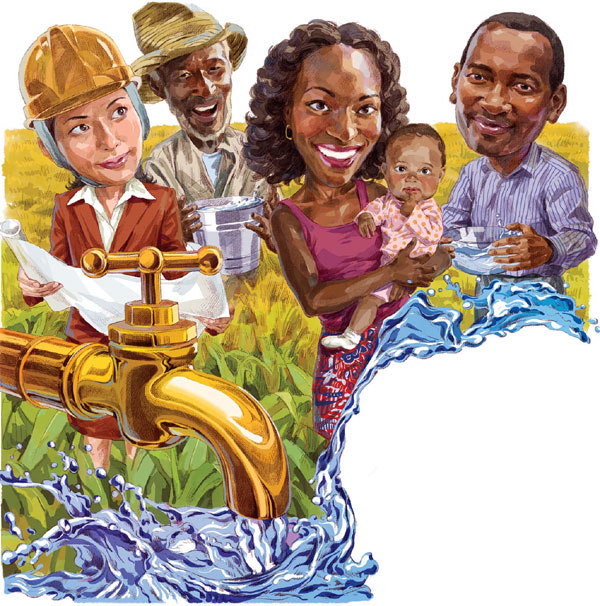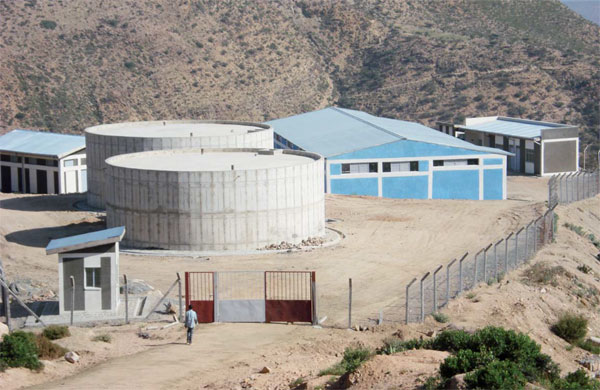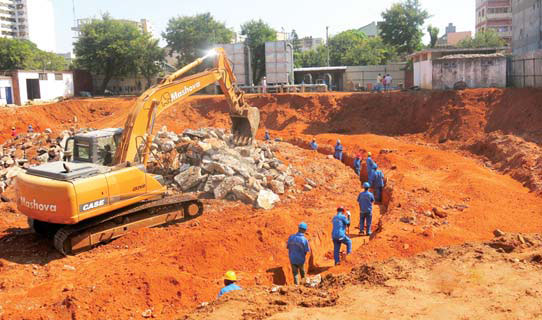
Chinese and Africans are working together to make the most of the greatest resource of all.
As Africa produces the kind of economic growth that is the envy of many countries and speeds along the road toward urbanization and mass consumerism, its lack of one particular resource threatens the whole project.
China, through its government and its businesses, is playing a key role in laying the foundations for the continent's continued growth by building bridges, buildings, railways and roads. Now Chinese specialists are also working to help Africa solve the biggest problem of all: a lack of water. That entails harnessing unused or unusable water and ensuring that the continent makes the best use of what it has.
Having access to clean water has long been a huge problem for Africans, rural and urban dwellers alike. The continent has just 9 percent of global renewable water resources but needs to support 15 percent of the world's population. The crisis is expected to worsen as a result of waste, pollution, dilapidated infrastructure and poor management - and particularly as a result of urbanization and rapid population growth.
About 40 percent of Africa's population lives in urban areas. That almost doubled from 205 million in 1990 to 400 million in 2010, and the United Nations Environment Programme has forecast that this will triple to more than 1.2 billion by 2050.
The UNEP says there is adequate land to produce enough food for a growing population for the next 50 years but that there is simply not enough water.
One reason for the crisis is poor watershed management and inadequate knowledge and skills in developing water resources planning, it says.
The World Health Organization says only 59 percent of the world's population has access to adequate sanitation, and efforts to achieve the Millennium Development Goal of 75 percent by next year are expected to fall short by nearly 500 million people.
In the case of Africa, experts believe that based on a progress report on implementation of the Millennium Development Goals, it will be hard, the way things are going now, for it to meet any of its goals. In fact, experts say some of the targets are now further from reach than they once were. Among those goals are good water and sanitation, environmental sustainability, reducing poverty, improving maternal health and reducing child mortality, all of which depend on water - once again underlining its pivotal role in so many things.
China, having itself grappled for years with balancing the needs of industrialization and the way water is used, is now helping Africa to tackle with such problems.
"Over the years, China has built up a lot of good, well developed technology and experience with watershed management and water resources planning that can help African countries," says Li Fengting, vice-dean of the College of Environmental Science and Engineering at Tongji University in Shanghai.
Cases of water pollution have exposed inefficiencies in supervision and management, says Li, who is also the senior program officer of the regional support office for the UNEP in Africa.
In 2008, China's Ministry of Science and Technology and the UNEP signed an agreement under which Chinese experts can pass on to Africans their expertise in water treatment as well as technology to improve the use of water throughout the continent. The overarching aim is to reduce poverty, improve food security and deal with the effects of climate change.
In 2011, the ministry and the UNEP jointly set up the China-Africa Cooperation Program on Environment, which is chiefly concerned with making best use of the water resources of the Nile River, Lake Tanganyika and the Sahara Desert.
Six projects have been conducted jointly by more than 20 universities and institutes in China in collaboration with partners in Africa, coordinated by the UNEP and with its technical support.
These projects are: planning water resources; developing and demonstrating new technologies for supplying safe water; monitoring the quality of treated waste water and its environment; using drought early-warning systems and adaptive technologies in arid areas; demonstrating water-saving technology designed for agriculture in dry areas; and developing and demonstrating technologies for combating desertification.
The aims are to make water use more efficient, to prevent environmental degradation, to increase agricultural production and to tackle climate change in African countries through technical support, demonstration and capacity building, says Li, who led one of the six projects.
Tongji University, renowned in China for its environmental science and engineering, has worked with Nairobi City Water and Sewerage Company and set up a demonstration project at Ngethu Water Treatment plant, the largest waterworks in East Africa, which supplies about 83 percent of Nairobi's potable water.
The water purification agents that Tongji University provides are said to be particularly useful for the water in Nairobi, which is highly turbid during the rainy season.
"We expect to work closely with Tongji University on safe water supply," says Peter Kuguru, chairman of the Board of Directors of Nairobi Water Company.
"This will not only improve the efficiency of the water and wastewater treatment works in quality and quantity, but also expose company staff to emerging technologies in water and wastewater management."
In addition, the project is likely to greatly benefit local people and improve environmental sustainability, Kuguru says.
One of the Chinese companies involved in water projects in Africa is the state-owned CBB Corporation. Over the past 10 years, it has helped raise the water supply coverage in Addis Ababa from 37 percent to 90 percent, which means the great bulk of city dwellers have access to tap water. Those who do not, live in remote areas.
The World Health Organization says the average water supply for urban residents is 100 to 120 liters for each person a day, but in suburban areas of Addis Ababa many people are still far from having that standard.
On the outskirts of the city, many residents still obtain their water from local sources.
"People have to fetch water with buckets and kettles for their daily cooking, drinking and cleaning," says Sun Guoqiang, general manager of CBB. "We want to help change that so they all have tap water."
The city's urban water supply system, which the French began to build in the 1930s, is showing its age, but given the expense of laying out a brand new system, the government decided to find partners to renovate it. CBB and a French company won the contract.
The project includes a dam and a water treatment system. The company will increase the height of the dam so it can hold more water, and expand the capacity of the water treatment system.
Addis Ababa has had no sewerage system, and CBB is designing one for the city. With sewage running on the street, even five-star hotels depend on sewer scavengers to take waste matter out of the city, Sun says.
Over time CBB's water supply solutions have reached beyond the cities into the whole country. A recent project involves taking water from one major industrial city, Dire Dawa, which is at a low altitude and has plenty of water, to another, Harar, which is at a high altitude and has no underground water. The company drilled wells in Dire Dawa and uses pumps to send water to Harar. This $12 million project is partly sponsored by the African Development Bank.
DCN International is another company that is eager to bag more water work in Africa. It won the Greater Maputo Water Supply Project on the outskirts of the capital city of Mozambique, with an estimated contract value of between $80 million and $100 million.
The company has built a significant part of the urban water supply system for downtown Maputo and now, as the population grows, the city is also expanding.
Lake Victoria, 1,200 kilometers to the southwest, is also receiving the attention of Chinese experts. Victoria is Africa's largest freshwater lake and the world's second-largest, and is the main drinking water source for Kenya, Tanzania and Uganda, in which it lies. In recent years the lake's water has suffered serious pollution at the hands of industry and increasing population.
Experts from Tongji University have looked at sewage treatment plants in the three countries and found that the concentration of organic matter and nutrients such as nitrogen and phosphorus in the effluents are very high.
In response, Chinese experts established a wetland, with a processing capacity of 400 cubic meters a day in Kisat Sewage Treatment Plant in Kisumu, Kenya. The wetland can remove pollutants from wastewater effectively. Local plants are introduced in the wetland to remove organic pollutants and nutrients from the wastewater. This is expected to reduce pollution of Lake Victoria and control and prevent eutrophication, the university says.
In rural areas of Kenya, Gansu Research Institute for Water Conservancy has done work with rainwater harvesting and safe drinking water in Laikipia and Machaokos counties. Solar pump, hand pump and household-based water purification systems have been installed there. Experts from the Gansu institute have also helped the Ministry of Water and Environment in Uganda to formulate a plan for developing, using and protecting the country's water resources over the next 20 years. The plan includes infrastructure for providing domestic drinking water and agricultural irrigation, and budget estimates, says Ma Chengxiang of the institute.
In Uganda, Chinese experts have also developed remote sensing imagery including a database to provide the country with information related to water and other natural resources.
In the Nile River basin, Chinese expertise in watershed management has been harnessed to diagnose water management problems and to provide solutions.
Lake Tanganyika, reckoned to be the second-largest freshwater lake in the world by volume, has also had ample attention from the Chinese experts. They have thoroughly assessed the lake catchment and developed a plan for improving the use and management of water resources.
Chinese experts have also passed on their knowledge of water resources planning, watershed management and the use of remote sensing to African technicians and compiled training books.
The Nanjing Institute of Geography and Limnology, part of the Chinese Academy of Sciences, has implemented a program of technical cooperation in protecting Africa's environment, in particular its water and soil resources.
The project aims to research, develop and demonstrate technologies adapted to African countries to monitor water quality, the environment, urban sewage treatment and soil remediation in collaboration with Chinese and African institutions and international organizations, to carry out joint field surveys, and to organize exchange visits, training and pilot projects.
The project's main activities include: looking at sewage disposal and environmental risks and problems in certain areas; increasing water monitoring and carrying out other environmental monitoring in the Lake Tanganyika basin; diagnosing techniques in urban sewage treatment plants in cities and improving technical collaboration in disposing urban sewage; planning networks for environmental monitoring stations in certain areas; remediating soil in oil fields across the continent; and training local technicians.
In addition to demonstration projects, Chinese universities and other institutions also organize regular training workshops for their African partners. Technicians, managers and staff from African organizations are invited to get hand-on training and to visit sites in China and in Africa.
Mohamed Abdel Monem, team leader of ecosystem management with the Regional Support Office for the UNEP in Africa, says collaboration between China and Africa to tackle the water crisis in the continent benefits both sides, and he looks on it as successful South-South cooperation.

Employees of DCN on the construction site of a water supply project in Maputo, Mozambique.

CBB is responsible for the $12 million project that transfers water from Dire Dawa city to Harar city in Ethiopia.